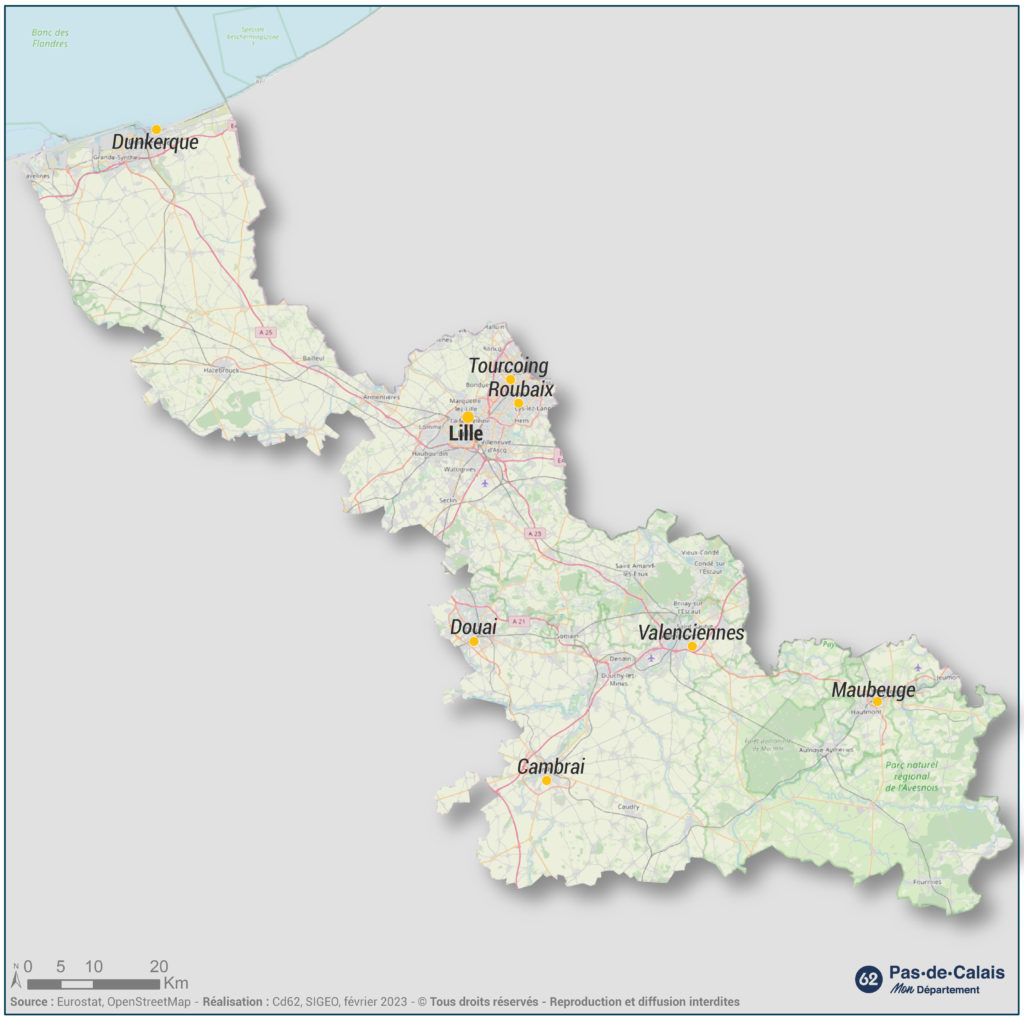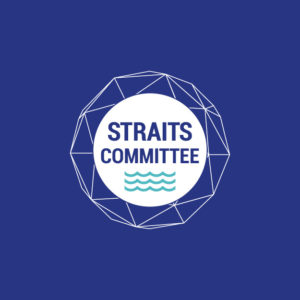
Number of counselors 82 (elected in pairs woman-man in 41 “cantons”)
Reference representative for the Straits Committee Mrs Sylvie Labadens, Delegate Counselor for International Relations.
Number of inhabitants 2.6 million
Budget 3.3 billion EUR
https://lenord.fr/jcms/j_6/accueil
Nord Department
The Nord department, one of the 5 departments in the Hauts-de-France region, is located, as its name suggests, in the far North of France, bordering Belgium for 350 km without any natural barriers, and Great-Britain for 35 km on the North Sea. It therefore has a privileged crossroads location in Europe between France, the United Kingdom and the Benelux. By high-speed train, Lille is located thirty-eight minutes from Brussels, one hour and twenty minutes from London and three hours from Amsterdam. Furthermore, an extensive network of motorways and several airports in the Nord provide easy access to these European capitals. Many French and Belgian residents cross the border sometimes daily to work, study, attend cultural, leisure and sport facilities, or simply visit their relatives. The most populous department of the French departments, the Nord is also four times denser than France, with the metropolis of Lille and its 1.2 million inhabitants, and several conurbations (Dunkirk, Valenciennes, Douai, Maubeuge…). Stretching from the coast of the North Sea to the countryside of the Thiérache, the Nord, although mainly urban, enjoys a wide variety of landscapes, such as plains, meadows, hills, dunes, bocage and forests.
Nord Department and cross-border cooperation
The Nord Department has long been involved in valuing its cross-border specificity as a leverof development of its territory (economy, mobility, spatial planning, attractiveness) and a way to provide new opportunities for its population (employment, education, services, cultural and linguistic openness, etc.). Cooperation is about working together as neighbours to address common challenges in a more effective and complementary way. Thus, cross-border action makes it possible to share experience and good practice, act on a European scale and reach out beyond the national territory. That’s why the Nord has been cooperating specially with its neighbouring Belgian provinces for more than 30 years, notably through Interreg projects on multiple themes (culture, social action, economy, environment, tourism, youth…).
Nord Department and the Straits Committee
The Straits Committee provides a space for cross-border dialogue and joint work in a new multilateral framework, with the aim of maintaining and developing cooperation, in the context of post-brexit, between Britain and its continental neighbors of France, Belgium and the Netherlands, and also between the latter. It represents an opportunity to extend the scope of cross-border cooperation to new European partners, allowing innovative actions to meet shared challenges across the Straits. Lastly, the Straits Committee serves as a forum for dialogue with a view to bringing common visions and proposals to regional, national and European authorities.
Common work themes of particular interest for Nord Department
Although no longer having economic competences, the Nord Department has approached businesses with the aim of strengthening the professional inclusion of unemployed people, and particularly young people. Its action is stepped up with increased funding and close support (coaching), European initiatives and eight departmental inclusion and employment agencies. The economic theme also includes the support to the tourism sector, in which the Nord is actively involved with its agency Nord Tourisme (“La Tangente”).
Addressing issues raised by climate change and adapting to its consequences are major issues for the Nord Department, for the North of France will be one of the most impacted territories in the country. Through its “Sustainable North” strategy, the Nord intervenes to preserve natural ecosystems and resources (renaturation, afforestation, land recycling, etc.), strengthen biodiversity, support sustainable actions: circular economy, waste reduction, local food production, sustainable mobility, energy poverty reduction.
Youth is a theme of great importance for the Nord Department. It provides social work and support towards children and young people in difficulty (child and youth care assistance), with the aim of preparing them for their future independent adult life. In addition to its competences in the construction, equipment and maintenance of public and private secondary schools (11-15 years old), the Nord supports specific educational actions. Finally, 82 junior elected representatives form the Youth Departmental Council, and work on many themes (school bullying, refugee children, ecology, disability, etc.), among which cross-border cooperation.

Copyright / Philippe Houzé


